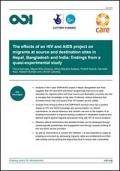Publications - Released in 2014
While mobility itself is not seen as vulnerability factor for HIV infection, the unsafe conditions under which people migrate exposes them to a greater risk of infection. Not only do policies and programmes in receiving or host countries hinder migrants from accessing health and social services, but cultural factors and their legal status may contribute to the discrimination they face and act as a further barrier to accessing services. Difficult working conditions, loneliness and feelings of powerlessness, together with peer pressure, may lead migrants to engage in risky sexual behaviours that leave them vulnerable to HIV and AIDS.
Similarly, those left at home may also face loneliness and exclusion. They may engage in risky behaviours for livelihood and survival purposes – particularly if the hoped-for remittances from migrants do not materialise – and can also be exposed to HIV infection by returning spouses or partners who may not be aware of their own HIV infection.
This briefing focuses on the situation across three South Asian countries, Nepal, Bangladesh and India.
Downloads
Organizations
- Overseas Development Institute (ODI)






